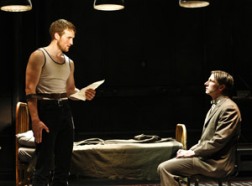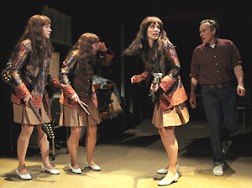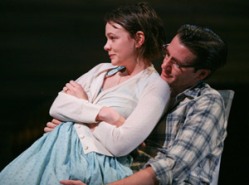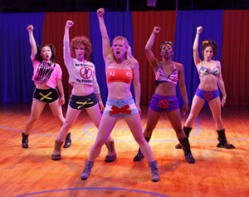Review: Spider-Man Turn Off the Dark
Jun 15th

After several delayed openings, endless technical problems and myriad cast injuries, Spider-Man: Turn Off the Dark has finally landed on Broadway, officially at least. The much maligned, reportedly $70 million musical about the popular comic book web-slinger has now opened after an unprecedented 183 previews, despite the withering reviews from impatient critics who jumped the gun a few months ago.
The retooled show, widely and waggishly referred to as “Version 2.0,” features a new director, Philip Wm. McKinley--here billed as “creative consultant”—and a greatly revised book, credited to original stager Julie Taymor, Glen Berger and new contributor Roberto Aguirre-Sacasa. Most of the original score by U2’s Bono and The Edge remains intact, with the addition of one new number, “A Freak Like Me,” delivered in campy fashion by the villainous Green Goblin.
The good news is that the show is greatly improved since its hiatus. Aguirre-Sacasa has simplified and tightened up the story, eliminating many of Taymor’s more metaphysical conceits, not to mention the “Geek chorus” of nerdy teens who annoying commented on the action. The role of the mythical spider-based character Arachne (T.V. Carpio) has been greatly reduced, along with her infamous, shoe-oriented musical number. The central conflict between Spidey and the Green Goblin has been beefed up, as has the central love story between Peter Parker and his high school sweetheart Mary Jane (Jennifer Damiano). The result is a much more cohesive, albeit rather pedestrian scenario that is undeniably easier to follow.
Most of Taymor’s elaborate design elements have been retained. George Tsypin’s lavish sets, making extensive use of multiple perspectives, comic book-style visuals and giant LED screens, provide constant eye candy, as do the wonderfully grotesque costumes and masks designed by Eiko Ishioka and Taymor respectively. The flying sequences, which now seem thankfully free of technical glitches, are as impressive as ever. Wisely, the spectacular battle between Spider Man and the Goblin, which used to end Act One, now constitutes the show’s climax.
Unfortunately, the evening remains an underwhelming theatrical experience, with the biggest disappointment being the unmemorable score. Bono and The Edge, who have written so many stirring anthems for U2, have failed to work similar magic here, with pedestrian music and lyrics that--with rare exceptions such as “Rise Above” and the lovely ballad “If the World Should End”--fail to be sufficiently stirring. While the sound mix has been improved, no doubt due to the increased presence of the composers in recent months, it’s not enough to make the music soar to the heights that it should.
As Parker/Spider Man, Reeve Carney boasts both an engaging stage presence and a powerful singing voice well suited to the rock-flavored score. He’s well matched by the winsome Damiano as Mary Jane, with Michael Mulheren, as Parker’s tyrannical boss, and Isabel Keating, in a variety of roles including Aunt May, providing solid support.
But it’s Patrick Page who, with his wonderfully campy, self-referential turn as the Green Goblin, steals the show and injects the frequently lugubrious proceedings with much needed antic humor. Maybe the show’s creators could go back to the drawing board yet again and make his character the evening’s primary focus. It would be a lot more fun.
Foxwoods Theatre, 213 W. 42nd St. 877-250-2929. www.ticketmaster.com.
Review: One Arm
Jun 13th

Tennessee Williams apparently had a bottomless drawer filled with forgotten plays and scripts, so it’s no surprise that in recent years they have begun to pop up with regularity. The latest example is Moises Kaufman’s adaptation of One Arm. Based on a 1944 short story which the playwright later adapted into an unproduced screenplay, this short, pungent drama isn’t truly successful enough to stand on its own terms. But it represents a fascinating coda to the prolific Williams’ career, and it has been given a vividly theatrical production courtesy of the New Group.
Kaufman’s self-reflective adaptation uses the device of a narrator (Noah Bean) reading aloud both verbatim passages from the short story and camera directions from the screenplay.
Set in 1967, it centers on Ollie Olsen (Claybourne Elder), a magnificent male specimen despite the fact that he only has one arm. A former Naval boxing champion, Ollie lost his limb in a car crash, and has since resorted to supporting himself as a male hustler serving both male and the occasional female clients.
“I would never let a man kiss me, I’m not gay trade,” declares the proud Ollie, who picks up his seedy clientele on the streets of New Orleans and other cities. Highly desired despite his incomplete physicality, he eventually finds himself working in a porn film, where a violent encounter with the director leads to his landing on death row for murder.
Aficionados will recognize the playwright’s familiar themes on display, with the piece featuring a sexual frankness he was necessarily forced to obscure in his earlier works.
While the symbolic resonance of both Ollie’s missing appendage—he’s referred to at one point as looking like “a piece of antique sculpture”--and his eventual dire fate is laid on a bit thick, the work nonetheless has enough fascinating elements to make its excavation more than welcome.
Director Kaufman has provided a vividly atmospheric production which makes excellent use of music and sound effects to augment its bare-bones staging. And the chiseled Elder is so physically commanding (and suitably emotionally blank) that he makes the lead character’s irresistibility entirely credible.
Acorn Theater, 410 W. 42nd St. 212-239-6200. www.telecharge.com.
Review: The Shaggs: Philosophy of the World
Jun 9th

A fascinating footnote to pop music history is explored to probing effect in the new musical The Shaggs: Philosophy of the World. Music geeks will recall that the band was composed of three teen-age girls who--at the urging of their Mama Rose-style stage father—recorded an album of original songs in which their lack of any musical talent was more than evident. Although the self-pressed recording quickly lapsed into well-deserved obscurity, it was later championed by several notable rockers who were enamored of its authentic rawness. Re-released years later, it was hailed by Rolling Stone magazine and has since become a cult favorite.
Although it contains sly touches of humor, the show takes a decidedly serious approach to the story, with the father, Austin (Peter Friedman), depicted as a deluded, semi-abusive parent bullying his daughters into realizing his own unfulfilled dreams. The fact that they have neither the necessary desire nor musical skills is apparently beside the point.
Joy Gregory’s dark-tinged book covers all of the essential points of the tale, concentrating on the tyrannical father’s obsessive desire, inspired by the mammoth success of the Beatles, to turn his daughters into stars. The girls themselves are only sketchily depicted, with the exception of the youngest, Helen (Emily Walton), who has retreated into a world of silence. But her rebellious streak is indicated by her hidden relationship with a classmate (Cory Michael Smith), who she later secretly marries.
The show’s humor stems not so much from the characters but rather the sheer atrociousness of the girls’ performances. The scene in which they record their album as a couple of engineers look on aghast is a comic highlight.
Unfortunately, the show is never quite involving as it should be, with the turgid proceedings eventually proving monotonous. Not helping matters is the score by Gregory and Gunnar Madsen--which, with a few exceptions, such as the father’s final defiant number “Never Fade,” which he sings as he literally sinks into his grave--too often mirrors its inspiration’s atonality.
Still, the story itself is so fascinating that the show merits attention. And it has been given a hauntingly stark, stylized production courtesy of director John Langs. Friedman, frequently singing intentionally off-key, is galvanizing as the monstrous dad; Annie Golden is appealingly sympathetic as his compliant wife; Sarah Sokolovic, Emily Walton and Jamey Hood handle their dramatic and musical chores with aplomb; and Kevin Cahoon and Steve Routman score laughs in their multiple supporting roles.
At one point late in the evening, we hear an excerpt from the actual recording made by the real-life Shaggs. Its sheer horribleness provides ample testament to the bizarreness of the tale.
Playwrights Horizons, 416 W. 42nd St. 212-279-4200. www.ticketcentral.com.
Review: Through a Glass Darkly
Jun 7th

Through a Glass Darkly, the theatrical adaptation of Ingmar Bergman’s 1961 film being presented by the Atlantic Theater Company, demonstrates how much his work depended on the brilliant use of imagery. This claustrophobic portrait of a young woman succumbing to mental illness feels dramatically wan on stage, despite an artfully atmospheric production by David Leveaux and excellent work by the fine four-person ensemble, including rising star Carey Mulligan (An Education, Broadway’s The Seagull) in the lead role.
Set in 1960 on a remote island (Bergman’s home of Faro in the film), the work-- adapted for the stage by Jenny Worton and previously seen at London’s Almeida Theatre—concerns a family vacation undertaken by twentysomething Karin (Mulligan); her solicitous, doctor husband Martin (Jason Butler Harner); her 16-year-old brother Max (Ben Rosenfield); and her self-absorbed, novelist father David (Chris Sarandon).
Despite Karin’s optimistic comment that “everything will be perfect this holiday,” it quickly becomes apparent that this will not be the case. Karin is clearly suffering from some sort of schizophrenia, a disease to which her mother succumbed. Gripped in the throes of religious hysteria, she comes to believe that she has a direct conduit to God.
Her husband attempts to treat her with regular doses of sedatives to little avail, while her father observes what’s happening with a clinical detachment, as if researching juicy material for an upcoming novel. And the brother, coping with his own adolescent angst, becomes even more sexually confused when Karin’s behavior towards him turns less than sisterly.
Unfortunately, what comes across so powerfully on film, especially with its haunting black and white cinematography, seems stilted onstage. Dialogue was never particularly Bergman’s strong suit, and Worten’s adaptation is little improvement.
Still, its themes come across effectively, especially with Bergman’s almost certainly autobiographical depiction of the father as an artist more concerned with his work than with the problems of the flesh-and-blood creatures surrounding him.
Takeshi Kata’s monochromatic grey set design provides a suitable starkness, and Karin’s increasing descent into madness is well conveyed by David Van Tieghem’s eerie music and sound effects.
Mulligan beautifully conveys her character’s emotional fragility, bearing both body and soul in her heart-wrenching performance. She’s well supported by her male co-stars, especially young Rosenfield in an impressive Off-Broadway debut.
Although a devoted theater practitioner, Bergman was famously reluctant to allow his films to receive stage adaptations. This only sporadically effective version of one of his greatest works demonstrates the creative pitfalls involved.
New York Theatre Workshop, 79 E. 4th St. 212-279-4200. www.ticketcentral.com.
Review: Lysistrata Jones
Jun 6th
 The award-winning Transport Group has lately been living up to its name, presenting site-specific revival of such works as The Boys in the Band and Hello Again in lofts in Chelsea and Soho respectively. Their latest production, Lysistrata Jones, makes even cannier use of an unconventional space. This musical updating of Aristophanes’ comedy concerns a group of high school women who decide to withhold sex from their boyfriends on the perennially losing Athens University basketball team until they win a game. So where better to mount the show on than on the basketball court of the Judson Memorial Church gymnasium?
The award-winning Transport Group has lately been living up to its name, presenting site-specific revival of such works as The Boys in the Band and Hello Again in lofts in Chelsea and Soho respectively. Their latest production, Lysistrata Jones, makes even cannier use of an unconventional space. This musical updating of Aristophanes’ comedy concerns a group of high school women who decide to withhold sex from their boyfriends on the perennially losing Athens University basketball team until they win a game. So where better to mount the show on than on the basketball court of the Judson Memorial Church gymnasium?
The fact that the church boasts a long and storied Off-Broadway history adds additional resonance to this cheekily entertaining diversion featuring a book by Douglas Carter Beane and music and lyrics by Lewis Flinn.
Resembling a special-themed episode of Glee, the show is more notable for the charged energy of its youthful ensemble than its creative elements. And it wears out its comedic welcome long before the conclusion of its two hour-plus running time.
Still, there’s fun to be had, beginning with the outrageous presence of the big-bodied Liz Mikel as the show’s acerbic narrator, Hetaira. Beane’s book, gleaning most of its vulgar humor from the overcharged sex drives of both the male and female characters, has a suitably burlesque quality. And while the score boasts few memorable songs, such numbers as “Right Now” and the climactic “Give It Up!” display a raucous energy.
Director Dan Knechtges (Xanadu, The 25th Annual Putnam County Spelling Bee) keeps things moving at an enjoyably frantic pace, and his choreography, influenced by both cheerleading routines and basketball court moves, is consistently inventive.
Among the ensemble, the standouts are Patti Murin, who provides just the right amount of perky sexiness as the title character; Jason Tam, very amusing as her unlikely, social media-obsessed love interest; and Josh Segarra, goofily endearing as the head jock.
Judson Memorial Church, 253 Thompson St. 866-811-4111. www.transportgroup.org.